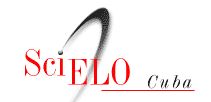Factores de riesgo de infección asociada al accidente cerebrovascular isquémico en pacientes mayores de 60 años
Resumen
Objetivo: identificar los factores de riesgo de infección asociada al accidente cerebrovascular isquémico en pacientes mayores de 60 años.
Métodos: se realizó un estudio analítico de cohorte prospectiva en pacientes mayores de 60 años con diagnóstico de accidente cerebrovascular isquémico atendidos en el Hospital General Universitario Carlos Manuel de Céspedes del municipio Bayamo, provincia Granma, en el período de tiempo comprendido desde enero del 2018 hasta diciembre del 2022. Se determinó como variable dependiente: infección asociada al accidente cerebrovascular isquémico y como variables independientes, los factores con posible influencia en el desarrollo de la infección asociada al accidente cerebrovascular isquémico. Se determinaron las medias y desviaciones estándar, junto con los valores mínimos y máximos de cada distribución y se obtuvieron frecuencias absolutas y relativas
Resultados: el modelo de regresión logística binaria, ajustado por el método hacia delante, identificó que los factores con influencia independiente son la puntuación de NIHSS > 13 puntos (OR = 18,0; IC 95 % = 7,3 - 44,3; p= 0,000), las enfermedades neurodegenerativas (OR = 17,3; IC 95 % = 3,4 - 87,8; p= 0,001), la disfagia (OR = 6,2; IC 95% = 2,5 - 15,3; p= 0,000) y la fibrilación atrial (OR = 4,2; IC 95% = 1,4 - 12,5; p= 0, 008).
Conclusiones: la gravedad del accidente cerebrovascular isquémico, la coexistencia de enfermedades neurodegenerativas y la disfagia constituyen los principales factores de riesgo de infección asociada al accidente cerebrovascular isquémico en pacientes mayores de 60 años.
Palabras clave
Referencias
Westendorp WF, Nederkoorn PJ, Vermeij JD, Dijkgraaf MG, van de Beek D. Post-stroke infection: a systematic review and meta-analysis. BMC Neurol. 2011;11(1):110.
Zhou J, Luo XY, Chen GQ, Li HL, Xu M, Liu S, et al. Incidence, risk factors and outcome of sepsis in critically ill post-craniotomy patients: A single center prospective cohort study. Front Public Health. 2022;10(12):895991.
Westendorp WF, Dames C, Nederkoorn PJ, Meisel A. Immunodepression, Infections, and Functional Outcome in Ischemic Stroke. Stroke. 2022;53(5):1438-48.
Vermeij JD, Westendorp WF, van de Beek D, Nederkoorn PJ. Post-stroke infections and preventive antibiotics in stroke: Update of clinical evidence. Int J Stroke. 2018;13(9):913-20.
Schweizer J, Bustamante A, Lapierre V, Faura J, Scherrer N, Azurmendi L, et al. SAA (Serum Amyloid A): A Novel Predictor of Stroke-Associated Infections. Stroke. 2020;51(12):3523-30.
Wang RH, Wen WX, Jiang ZP, Du ZP, Ma ZH, Lu AL, et al. The clinical value of neutrophil-to-lymphocyte ratio (NLR), systemic immune-inflammation index (SII), platelet-to lymphocyte ratio (PLR) and systemic inflammation response index (SIRI) for predicting the occurrence and severity of pneumonia in patients with intracerebral hemorrhage. Front Immunol. 2023;11(15):31.
Chen X, Li D, Liu Y, Zhu L, Jia Y, Gao Y. Nutritional risk screening 2002 scale and subsequent risk of stroke-associated infection in ischemic stroke: The REMISE study. Front Nutr. 2022;9(89):5803.
Simats A, Liesz A. Systemic inflammation after stroke: implications for post-stroke comorbidities. EMBO Mol Med. 2022;14(9):e16269.
Sacco RL, Kasner SE, Broderick JP, Caplan LR, Connors JJ, Culebras A, et al. An updated definition of stroke for the 21st century: a statement for healthcare professionals from the American Heart Association/American Stroke Association. Stroke. 2013;44(7):2064-89.
Smith CJ, Kishore AK, Vail A, Chamorro A, Garau J, Hopkins SJ, et al. Diagnosis of Stroke-Associated Pneumonia: Recommendations from the Pneumonia in Stroke Consensus Group. Stroke. 2015;46(8):2335-40.
Horan TC, Andrus M, Dudeck MA. CDC/NHSN surveillance definition of health care-associated infection and criteria for specific types of infections in the acute care setting. Am J Infect Control. 2008;36(5):309-32.
Akimoto T, Hara M, Morita A, Uehara S, Nakajima H. Relationship between Nutritional scales and prognosis in elderly patients after acute ischemic stroke: Comparison of Controlling Nutritional Status Score and Geriatric Nutritional Risk index. Ann Nutr Metab. 2021;77(2):116-23.
Mazumdar M, Glassman JR. Categorizing a prognostic variable: review of methods, code for easy implementation and applications to decision-making about cancer treatments. StatMed. 2000;19(1):113-32.
Gens R, Ourtani A, De Vos A, De Keyser J, De Raedt S. Usefulness of the Neutrophil-to-Lymphocyte Ratio as a Predictor of Pneumonia and Urinary Tract Infection Within the First Week After Acute Ischemic Stroke. Front Neurol. 2021;13(12):671.
Zaid Y, Rajeh A, Teshnizi SH, Alqarn A, Tarkesh F, Esmaeilinezhad Z, et al. Epidemiologic features and risk factors of sepsis in ischemic stroke patients admitted to intensive care: A prospective cohort study. J Clin Neurosci. 2019;69(3):245-9.
Graversen SB, Pedersen HS, Sandbaek A, Foss CH, Palmer VJ, Ribe AR. Dementia and the risk of short-term readmission and mortality after a pneumonia admission. PLoS ONE. 2021;16(1):e0246153.
Järvinen H, Tolppanen AM, Hartikainen S. Risk factors of pneumonia in persons with and without Alzheimer’s disease: a matched cohort study. BMC Geriatr. 2023;23(1):227.
Schäfer S, Zernecke A. CD8+ T Cells in Atherosclerosis. Cells. 2020;10(1):37.
Enlaces refback
- No hay ningún enlace refback.
FINLAY EN: 








FINLAY CERTIFICADA POR:

Esta revista "no aplica" cargos por publicación en ninguna etapa del proceso editorial.
Dirección postal: Calle 51A y Avenida 5 de Septiembre Cienfuegos, Cuba Código postal: 55100.
http://www.revfinlay.sld.cu
Telefono: +53 43 516602. Telefax: +53 43 517733.
amgiraldoni@infomed.sld.cu
ISSN: 2221-2434
RNPS: 5129






